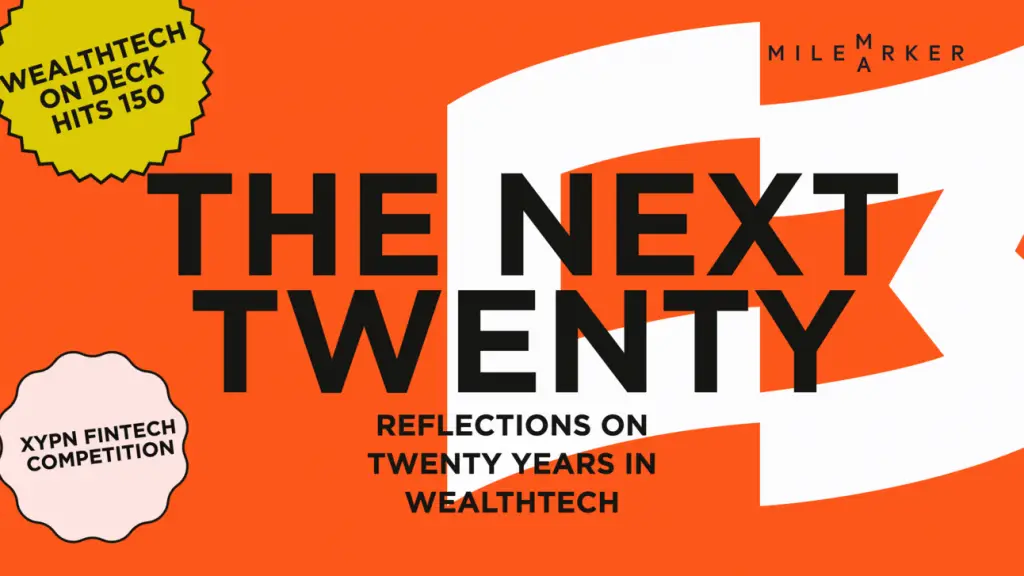Twenty years ago, I was four weeks away from marrying Kim Mackrill and finishing undergrad. At the same time, I was trying to figure out what I wanted to do for a year or so before grad school.
While hanging out with our friends, Scott & Heidi Klaassen, Scott mentioned that he was working at a company called Orion. I hadn’t heard of it, and assumed he was talking about Orizon, a firm led by Dan Tucker, which has since become part of Mariner. I’d heard of Orizon. But I didn’t know anything about Orion.
I was thankful I double-checked Mapquest at the time, or I would have walked into Orizon. Instead, I made my way to Orion’s offices at 147th and F Street in the Millard area of Omaha and met Randy Lambert.
Randy had started at CLS Investments and when Orion spun out, he’d become the COO of this young tech start up. He was looking for people who could work with advisors and their data and he took a gamble on me.
In 2004, Yahoo! had just moved Google outside of their tech stack as Google surged to 200 Million searches per day. The average American had been turning to Amazon for way more than just books. Although online commerce was hitting its stride, the technology side of investments was still novel. In the world of wealth management, I was surprised how data moved between institutions and reporting software.
I had no idea how much work it was to transfer data between old systems, load it into a reconciliation system, get it to reconcile, and then print correct data on a statement — which, then, we often printed in our office and mailed to the retail clients using the brands of our 20 or so clients.
As I thought about the future, it was easy to imagine a day when the manual work we did wouldn’t be necessary. Surely the Custodians would make the data move so smoothly and accurately that we would simply present it without anything in the middle?!
I wondered when advisory fee billing would become as easy as Stripe.
I imagined that there would be a Shopify-like solution of payouts to make everything seamless.
Everything would be delivered to clients through mobile apps that looked and functioned like Uber.
I wondered if my job would be obsolete within the year.
I had a lot to learn.
Looking ahead
The past 20 years did not lead us anywhere close to a harmonious singularity of data, like I imagined would happen in 2004. While I doubt the future will ever get everyone from custodians to planning softwares to the IRS to work in harmony, we can still have some fun and imagine the next 20 years together.
Stop for a moment and imagine. What do you think will happen with the technology in our space?
Here’s what I see:
1. Data Domination
Your Firm will be paying for data more than software. For some, this may already be the case. As this becomes normalized, the sooner you are in a position to receive and store data, the faster you’ll be able to level up your services, scale and increase your firm’s value.
Timeframe to relevance: 8 years
2. Have a Seat. How are things?
Advisors will look and behave even more like therapists. The information will take care of itself, but helping people with their psychological well-being will finally completely take center stage. This will become really multidimensional as people start to unpack more of their uniqueness.
Timeframe to relevance: Now
Point of Action: Look for up and coming advisors who’ve taken classes beyond Freshman Psychology or who are incorporating counseling classes and training alongside standard CE.
3. Augmented Mentality
Most of reality will be augmented. Instead of just getting bombarded with political ads when we walk into a geofenced area, we’ll get legitimately helpful prompts and details through smart devices. The innovation will finally find adoption when the information we receive actually augments our activity, not obstructs it.
Will be able to view any physical or digital object and learn whatever we want to know about it. Product creators will get to elevate their marketing collateral to include immersive brand experiences.
Those who don’t communicate this way will either be irrelevant or making a deliberate point to remain exclusive luxury brands.
Timeframe to relevance: 10 years
4. All the Markets all the Time
Due to the influence of the crypto markets, we are already in the emerging phase of markets never closing. To keep up with consumer demand and expectation, public markets will start trading around the clock. To meet the constant desire for more, watch for new ways to gain access to private funds via public markets.
This will have a large impact on staff, behaviors and the technology you use. It will place a greater emphasis on real-time analysis, data transmission, automated reconciliation, and everything you need to move swiftly.
Timeframe to relevance: 3-8 years
5. Everything will be Tokenized, Exchanges will be Multiplied
The future will likely lead to broad-based tokenization where every legal agreement, share, and transaction is represented in some sort of tokenized form. While currently novel, the real opportunity will be in the ability to exchange tokens more easily between parties outside of any custodian as we know it today.
Shareholders will sell tokenized shares on secondary markets to strangers who swap values in anonymous wallets. This will lead to a drive for increased regulation as this will likely lead to a new level of activist investors.
Timeframe to relevance: 5 -15 years
6. Decision & Scenario Modeling Will Be Infinite
With the ability to run situation analysis on any opportunity, retail clients can unlock all sorts of decision guidance with the power of a prompt.
Your OCD friends will lose their minds, and your free-spirited friends will run away from it. Advisors will constantly be navigating the best ways to present information that doesn’t offend or overpower.
Timeline to relevance: 7 years
7. Advisors will Plan Experiences for Clients
This happens in pockets today, but a big part of your commitment to your clients will lead to advisors designing experiences for clients to augment their wealth experience.
– Trips
– Holiday Celebrations
– Special Occasions
– Family Retreats
– Helping Aging Clients Capture and Document Memories
Timeline to relevance: Now
8. The Majority of Your Clients Won’t Have a Formal Singular Job
Depending on who you work with today, you may already have lots of clients without W2s. With the gig economy the the need for fractional specialization, you will have advisors who specialize in all sorts of unique niche audiences with clients in far less than formal careers.
Timeline to relevance: now in many markets, 3 years everywhere
9. Every RIA will be Expected to Serve as a Family Office
Expectations are tough. The reality is that your clients are only going to expect more from you. The best model for that expectation is the family office of today. Baked in legal, accounting, bill pay, laundry service (sort of kidding), etc.
To prepare for this, we need to rethink our fee schedules and start building our networks of personnel who can provide you FO-level services. The top firms I work with are already well underway.
Timeline: Now and increasing daily
10. More Information Will Lead to Less Happiness
With the ability to have all of these details in our lives, models, projections, and various scenarios, people overall satisfaction will decline. One of the glories of life, lies in the excitement of the unknown. The deluge of information available to the average person will be waiting to catch the hope of humans to dissuade them from happiness into a certainty that isn’t accurate. People will have to fight harder to find joy.
Timeline to relevance: Right Now
What’s Your Top Ten for the Next Twenty?
You heard my list of things I’ll probably be really wrong about. I’d love to hear your thoughts on where the world is going.
What am I wrong about?
What about do you see that I didn’t mention?

